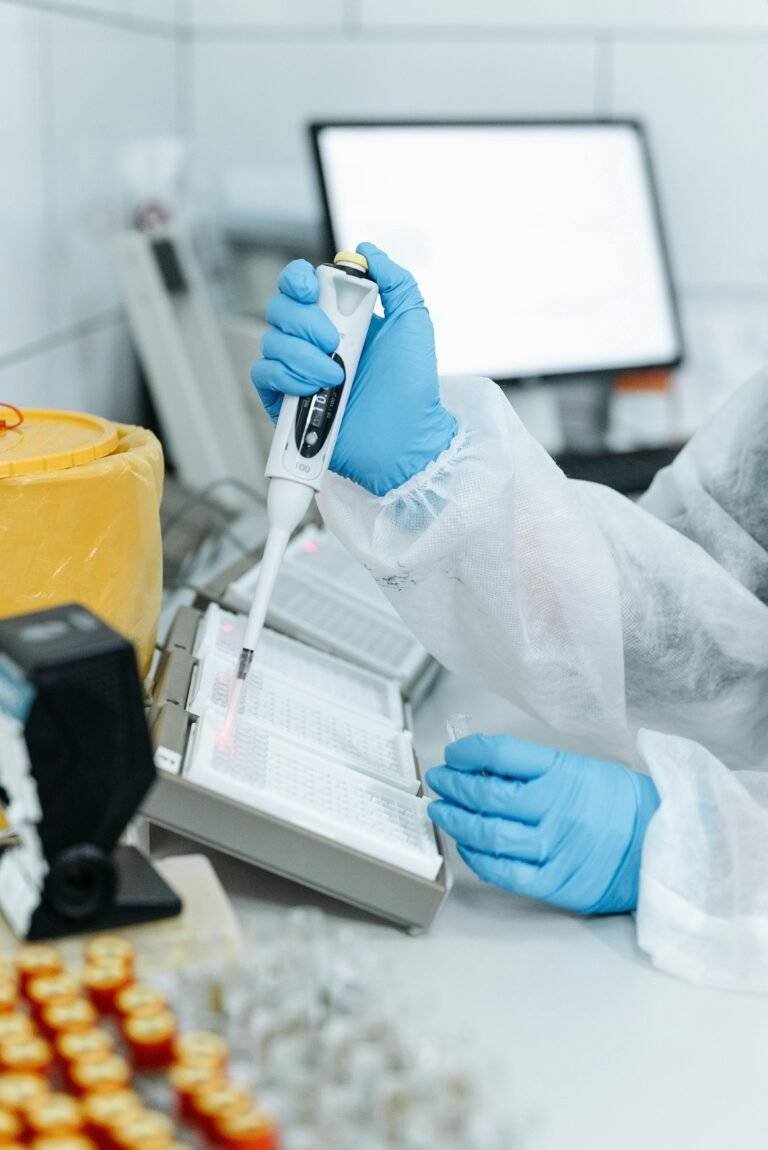Discover the Power of Precision Genomics Today
In the fast-changing world of healthcare, precision genomics is changing the game. It offers personalized medical solutions that are transforming patient care. With advanced genetic analysis, doctors can now tailor treatments and improve disease prevention.
The global genomics market has grown a lot, from $17.2 billion in 2019 to a predicted $82.6 billion by 2027. This big jump shows how much precision genomics is changing healthcare. In the U.S., human genetics and genomics added $265 billion to the economy in 2019, a huge increase from the last decade.
At the heart of this change are advanced technologies like next-generation sequencing (NGS). These tools help create detailed genetic profiles. They are changing how we treat cancer, diagnose rare diseases, and practice personalized medicine.
By understanding an individual’s genetic code, doctors can create targeted treatments. They can also improve medication plans and help patients take charge of their health. This is a big step towards better health and wellness.
Key Takeaways
- Precision genomics is driving a healthcare revolution, offering personalized solutions for improved disease treatment and prevention.
- The global genomics market is experiencing exponential growth, from $17.2 billion in 2019 to a projected $82.6 billion by 2027.
- Advanced technologies like next-generation sequencing (NGS) are enabling comprehensive genomic profiling, transforming the way we approach cancer treatment, rare disease diagnosis, and personalized medicine.
- Precision genomics is poised to unlock new possibilities in the pursuit of optimal wellness, empowering patients and healthcare providers alike.
- The integration of precision genomics into healthcare has the potential to significantly improve patient outcomes and reduce medical costs.
Understanding Precision Genomics
Precision genomics is changing healthcare by using genetic information. It uses advanced DNA sequencing and data analysis to tailor care to each person. This field helps understand how genes, environment, and lifestyle affect health.
It can tackle many health issues, from rare diseases to chronic conditions. This makes healthcare more personal and effective.
What is Precision Genomics?
Precision genomics, or personalized medicine, aims to give the right care at the right time. It uses new genetic research and technology. This field goes beyond cancer to include cardiology and neuroscience.
The goal is to find out why some people get sick and how they respond to treatments. It’s about improving health outcomes for everyone.
Key Components of Precision Genomics
- Advanced DNA Sequencing Techniques: This field uses top DNA sequencing to quickly and accurately read an individual’s genetic code. It reveals a lot about their genetic makeup.
- Data Analysis and Interpretation: The huge amounts of genetic data need advanced tools and experts to find important genetic variants. These variants can affect health and disease.
- Multidisciplinary Collaboration: Precision genomics needs teamwork from geneticists, bioinformaticians, and clinicians. This ensures the right use of genomic insights in healthcare.
The promise of precision genomics is huge, but we must be careful with genetic data. Making clear links between genes and health takes careful research and understanding. With precision genomics, healthcare can offer better treatments and prevention strategies.
“The goal of genomic research is to find the relationship between genes and the functions of cells and organs in health and disease.”
The Role of Technology in Precision Genomics
The field of precision genomics has seen a big change thanks to new sequencing methods. These include whole genome sequencing (WGS), whole exome sequencing (WES), and targeted gene sequencing. These technologies have made getting genetic information faster and cheaper, opening doors for its use in medicine.
Advanced Sequencing Techniques
WGS gives a full view of the genome, helping find changes that might cause diseases. Whole exome sequencing looks at the parts of the genome that code for proteins, aiming to find mutations linked to diseases. Targeted gene panels are also used, focusing on certain genes or pathways to save time and money.
Data Analysis and Interpretation
The huge amounts of genetic data from these methods need advanced tools to understand. Scientists and doctors use complex algorithms and machine learning to spot mutations linked to diseases. They then figure out how these might affect a person’s health and how they might react to treatments.
| Sequencing Technique | Coverage | Advantages |
|---|---|---|
| Whole Genome Sequencing (WGS) | Comprehensive | Identifies structural rearrangements and non-coding variants |
| Whole Exome Sequencing (WES) | Targeted | Focuses on protein-coding regions and disease-associated mutations |
| Targeted Gene Panels | Specific | Cost-effective and efficient for analyzing specific genes or genetic pathways |
The use of these new sequencing methods and bioinformatics tools has been key in advancing precision genomics. It’s helping make healthcare more personalized and effective.
“The declining costs of DNA-sequencing techniques have led to more widespread adoption of precision medicine, allowing for the identification of disease-associated genetic variants and the development of targeted therapies.”
Benefits of Precision Genomics in Healthcare
Precision genomics is changing healthcare by making treatments more personal and preventing diseases better. It uses a person’s genetic information to give them treatments that work better and have fewer side effects. This is especially good for managing cancer, diagnosing rare diseases, and figuring out how well drugs will work.
Personalized Treatment Plans
Precision genomics lets doctors create treatment plans that fit each person’s genes. Biomarker testing, like checking tumors, finds genetic changes that cause diseases. This helps doctors pick the best treatments, as seen in Tiffany’s case with her breast cancer.
Pharmacogenomics looks at how genes affect how we react to drugs. It helps doctors give safer and more effective medicines, like in Alyssa’s treatment for Tourette syndrome.
Enhanced Disease Prevention Strategies
Precision genomics also helps prevent diseases by finding genetic risks early. This lets doctors start interventions and lifestyle changes early. For example, continuous glucose monitoring systems help manage diabetes better, as shown in Anthony’s story.
Using mobile devices to track health habits is also helpful. It helps patients like Juan stick to their treatment plans and healthy lifestyles.
The All of Us Research Program is a big effort to improve precision health. It aims to collect data from over a million U.S. participants. This will help understand diseases better and make treatments more effective.
“Precision genomics offers the potential to detect disease indicators earlier, improving patient outcomes and reducing healthcare costs.”
Applications of Precision Genomics
Precision genomics is changing healthcare in big ways. It’s making a huge difference in oncology and helping with rare genetic disorders. It’s making healthcare better than ever before.
Cancer Genomics
In oncology, precision genomics is a big deal. It lets doctors find the right treatments for each patient. This makes treatments work better and reduces side effects.
Rare Disease Research
It’s also helping with rare genetic disorders. New discoveries are being made. This gives hope to those affected by these conditions.
Pharmacogenomics
Pharmacogenomics is another area where precision genomics shines. It helps predict how well a drug will work for someone. This means doctors can give better treatments.
Precision genomics is changing healthcare in many ways. It’s helping with cancer, rare diseases, and making treatments better. It’s a big step forward.
| Application | Key Highlights |
|---|---|
| Cancer Genomics | – Tumor DNA sequencing guides targeted therapies – Personalized approach enhances treatment efficacy and minimizes adverse effects |
| Rare Disease Research | – Advanced genomic techniques uncover new disease mechanisms – Significantly improved diagnostic rates for rare genetic disorders |
| Pharmacogenomics | – Genetic information predicts individual drug response – Optimized medication selection and dosing for personalized drug therapy |
“Precision medicine aims to target the right treatments to the right patients at the right time by tailoring disease prevention and treatment based on variances in genes, environments, and lifestyles.”
The Impact of Precision Genomics on Drug Development
Precision genomics is changing how we develop drugs. It uses genomic technologies to find genetic markers for drug responses. This has led to big steps forward in targeted drug development, biomarker discovery, and clinical trial efficiency. It’s making personalized medicine a reality.
Streamlining Clinical Trials
One big plus of precision genomics is making clinical trials faster and cheaper. It lets researchers pick the right patients for a drug. This cuts down on trial time and cost, and makes drug development more effective.
Reducing Drug Development Costs
Precision genomics also helps cut down drug development costs. It focuses on the most promising drugs, reducing the chance of failure. Plus, genetic testing can predict how well a drug will work, saving money in the long run.
| Metric | Impact of Precision Genomics |
|---|---|
| Clinical Trial Success Rates | Increased by 25% through targeted patient selection |
| Drug Development Costs | Reduced by 30% through improved trial efficiency and reduced failure rates |
| Time-to-Market | Decreased by 12 months on average |
The effect of precision genomics on drug development is clear. It gives researchers and doctors a better understanding of genetics in disease and drug response. This field is leading to more targeted, efficient, and cost-effective drug development. It’s improving patient care and changing healthcare’s future.
Ethical Considerations in Precision Genomics
As precision genomics grows, it brings up big ethical questions. One key issue is genetic privacy and keeping genetic data safe. People worry that this info could be misused by employers or insurers, leading to unfair treatment.
Another big challenge is informed consent in genetic studies. It’s hard to understand all the effects of genetic info right away. So, we need strong rules to help share findings and let people see their genetic data.
Privacy Concerns and Genetic Data
Precision genomics could change healthcare a lot, but it also makes us think about genetic privacy and data safety. Patients are scared about their genetic info being used wrongly by employers or insurers. It’s important to protect this data to build trust and make sure personalized medicine is used right.
Informed Consent in Genomic Research
The ethics of ethical genomics also touch on informed consent in genetic studies. As precision medicine gets better, it’s not always clear what genetic findings mean right away. We need strong rules to help share findings and let people see their genetic data. This is key for protecting patient rights and making sure genetic research is done right.
“Balancing the benefits of genomic research with privacy protection remains a key challenge in the field of precision medicine.”
As precision genomics promises to change healthcare, we must tackle these ethical concerns head-on. Healthcare workers and lawmakers need to work together. They must make sure personalized medicine is used responsibly and with transparency, always putting patients first.
Personal Stories: How Precision Genomics Changes Lives
The power of precision genomics is seen in real-life stories. Patients’ lives have been changed by this new healthcare approach. It tailors treatments based on a person’s genes, leading to big wins in fighting rare diseases.
Patient Testimonials
A 4-year-old girl was diagnosed with Glut1 deficiency syndrome through whole genome sequencing. This rare disorder was managed with a special diet, improving her life. A 10-year-old girl with a severe chickenpox infection got a new treatment plan thanks to genomic analysis. Now, a bone marrow transplant is being considered to cure her.
Case Studies in Precision Medicine
These stories show how precision genomics can change lives. It helps find important diagnoses and create personalized treatment plans. This leads to better health and happiness for patients. As genomic diagnosis and personalized treatment success grow, we see rare disease breakthroughs that were once dreams, changing healthcare one life at a time.
“Precision genomics has given me a second chance at life. The targeted treatment plan based on my genetic profile has been life-changing.”
The Future of Precision Genomics
The future of precision genomics is bright, thanks to fast tech advances. These changes will change how we diagnose, treat, and prevent diseases. New tools like artificial intelligence and liquid biopsy are leading the way.
Emerging Trends and Innovations
Artificial intelligence (AI) is becoming a big player in genomics. It helps make sense of huge amounts of genetic data. This means doctors can diagnose and plan treatments more accurately and quickly.
Liquid biopsy is another big leap. It lets doctors check for disease markers in blood or other fluids without surgery. This could lead to catching diseases early and managing them better.
Gene editing, like CRISPR, is also getting better. It might help fix genetic problems before they cause disease.
Predictions for Genomic Medicine
Genomics will soon be a big part of regular healthcare. Preventive genomics will help people stay healthy by knowing their genetic risks.
Doctors will soon use genetic info to make treatments that work better for each person. This means better health outcomes and fewer side effects.
These changes could make healthcare more personal and effective. We might see better disease prevention, earlier detection, and more precise treatments.
“The future of medicine is in the genome. We now have the opportunity to use genomic information to improve health and prevent disease.”
| Emerging Trends | Predictions for Genomic Medicine |
|---|---|
|
|
Precision Genomics in Nutrition and Wellness
The field of nutrigenomics is changing how we view nutrition and wellness. It helps us understand how our genes affect how we react to food. This lets us make diets that are just right for each person, helping to prevent diseases.
Tailored Dietary Recommendations
Nutrigenomics looks at how genes and nutrients work together. It helps doctors give advice on food based on a person’s genes. This way, diets can be made to fit each person’s health needs, helping them stay healthy.
Genetic Testing for Nutritional Health
Genetic testing has gotten better, giving us insights into what we need to eat. Doctors can see how our genes affect our health and how we digest food. This helps them make diets that are perfect for each person, supporting their health.
Using nutrigenomics and personalized nutrition is changing health care. It’s not just for one person; it’s for everyone. By making diets fit each person’s genes, we can make health better for everyone.
“The future of health is not one-size-fits-all. It’s personalized, precision, and tailored to your unique genetic makeup.”
How to Get Started with Precision Genomics
Exploring precision genomics can seem overwhelming at first. But, with the right help, you can discover its full potential. Whether you’re interested in learning about your genes or want personalized health care, the first step is to find a reliable genetic testing provider.
Finding a Genetic Testing Provider
Begin by talking to your doctor. They can suggest trusted genetic counseling services or DNA testing services you can use directly. Look for providers that offer detailed genomic health assessments and follow ethical standards. It’s crucial to pick a provider that keeps your genetic information safe and private.
Understanding Your Results
Understanding your genetic results can be tricky. That’s where a genetic counselor is very helpful. They can help you understand your genetic reports, explaining what your results mean and what steps you might need to take next.
You might find out things that surprise you, which could affect your health or your family’s. Talk to your genetic counselor about these possibilities and how they might change your life.
“Genetic counseling is essential in helping individuals and families understand the meaning and significance of their genetic information. By providing personalized guidance, genetic counselors empower patients to make informed decisions about their health and well-being.”
Starting your journey in precision genomics is exciting, but it’s also a rapidly changing field. Keep up with new research and ask questions. Work with your healthcare team to fully benefit from this powerful tool for better health and wellness.
Join the Movement: Engage with Precision Genomics
Getting involved in precision genomics is more than just learning about it. It’s about staying updated, joining the community, and supporting progress in healthcare. This field is changing how we approach health, and everyone can play a role.
Resources and Additional Learning
There are many educational resources to help you learn more about precision genomics. Websites like the National Institutes of Health (NIH) and the American Society of Human Genetics (ASHG) have great information. They offer online courses, webinars, and publications that are full of insights.
By exploring these resources, you can learn about the latest in precision genomics. You’ll also get to see how it’s changing healthcare. This knowledge will help you advocate for personalized care.
Community Support and Networking Opportunities
Patient advocacy groups are there to support you if you have a genetic condition. They offer advice, resources, and a chance to meet others who understand what you’re going through. These groups are a great place to start.
There are also conferences, forums, and social media where you can meet experts and learn more. These platforms are perfect for staying in the loop and working together to advance precision medicine.
Q: What is precision genomics?
A: Precision genomics uses genetic info to tailor medical care. It involves advanced DNA sequencing and data analysis. This helps understand rare diseases and complex conditions.
Q: What are the key components of precision genomics?
A: Key components include advanced DNA sequencing and data analysis. Complex bioinformatics tools are used. Expert interpretation of genetic variants is crucial.
Q: How does precision genomics benefit healthcare?
A: It leads to personalized treatment plans. This improves treatment outcomes and reduces side effects. It also helps in disease prevention by identifying genetic risks early.
Q: What are the applications of precision genomics?
A: It’s used in cancer management, rare disease diagnosis, and pharmacogenomics. It helps identify genetic biomarkers for drug efficacy and toxicity. This streamlines clinical trials and drug development.
Q: What are the ethical considerations in precision genomics?
A: It raises concerns about privacy and genetic data handling. There’s worry about misuse by employers or insurers. Informed consent in genomic research is complex.
Q: How can individuals get started with precision genomics?
A: Seek genetic testing through healthcare professionals or direct-to-consumer services. Choose reputable providers that follow ethical guidelines. Genetic counselors help understand results.
Q: How can individuals engage with the precision genomics movement?
A: Stay updated with online courses, webinars, and publications from scientific organizations. Participate in genomic research and connect with experts at conferences and online.





